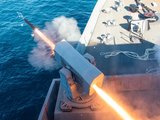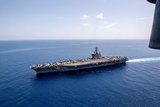UK MoD invests £20 million for Royal Navy OPVs
The UK Ministry of Defence (MoD) has committed £20 million to its plans to purchase three new Offshore Patrol Vessels (OPVs) for the Royal Navy, with the signing of a contract with shipbuilder BAE Systems.
The contract will enable BAE Systems to begin work on parts such as the engines and gearboxes ahead of the commencement of the main shipbuilding programme.
The MoD announced in November 2013 that it would purchase the OPVs to add capability to the Royal Navy fleet, while plugging a construction gap at the BAE Systems shipyards on the Clyde in Scotland.
Philip Dunne, Minister for Defence Equipment, Support and Technology, said: ‘This £20 million is a significant milestone, critical to the successful delivery of these three vessels for the Royal Navy. The OPVs will not only provide an additional capability for the UK but also at its peak, the OPV programme will safeguard more than 800 vital skilled roles in the shipbuilding industry.’
The plan is for the OPVs to support counter-terrorism, counter-piracy and anti-smuggling operations in the waters around the UK and other UK interests abroad. Compared to the current River Class ships, the new OPVs will have more storage and accommodation facilities and a larger flight deck for Merlin helicopters. The first OPV is expected to be delivered to the Royal Navy in 2017.
More from Naval Warfare
-
![European navies line up $105.8 billion in unawarded contracts for 2026]()
European navies line up $105.8 billion in unawarded contracts for 2026
France, Germany and Italy lead the way on unawarded naval defence opportunities that could be awarded this year, but across Europe countries are ramping up their spending efforts to face geopolitical challenges.
-
![Spain’s F100 upgrade mirrors Aegis modernisation paths in allied navies]()
Spain’s F100 upgrade mirrors Aegis modernisation paths in allied navies
The Spanish Navy’s Alvaro de Bazan-class of air defence frigates will receive the latest Aegis Weapon System technology among other modernisations to extend the service life to 2045.
-
![UK’s Fleet Solid Support ship programme deemed on track despite steel supply concerns]()
UK’s Fleet Solid Support ship programme deemed on track despite steel supply concerns
Shipbuilders are saying the programme is going ahead on time as the government estimates 7.7 million tonnes of steel are needed for 2026 infrastructure projects.
-
![Raytheon unveils details of its proposal for the US Navy/NATO ESSM Next Significant Variant]()
Raytheon unveils details of its proposal for the US Navy/NATO ESSM Next Significant Variant
In an exclusive interview with Shephard, Raytheon’s VP of Shipboard Missiles disclosed what improvements the company plans to offer for the Sea Sparrow NSV.






















